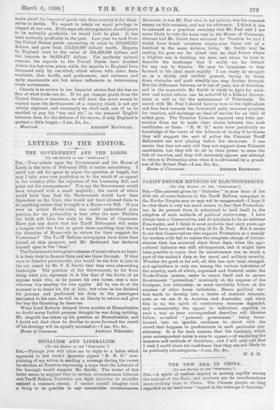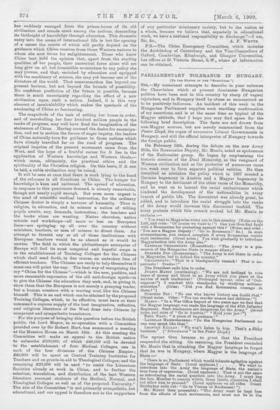THE NEW ERi. IN CHINA.
[To THE EDITOR OF THE " SPECTATOR."'
Six,--A spirit of restless inquiry is moving rapidly among the nations of the East; and nowhere are its manifestations more striking than in China. The Chinese people, so long regarded as an inert race " lapped in the lethargy of fatalism,"
has suddenly emerged from the prison-house of its old civilisation and stands erect among the nations, demanding its birthright of knowledge through education. This dramatic entry into the arena of international life is but the opening of a career the course of which will partly depend on the guidance which China receives from those Western nations to whom she now turns for enlightenment. Those who know China best hold the opinion that, apart from. the sterling qualities of her people, their numerical force alone will ere
long give an all but irresistible momentum to any policy she may pursue, and that,, enriched by education and equipped
with the machinery of science, she may yet become one of the dictators of the world. That consummation lies beyond our present horizon, but not beyond the bounds of possibility. No confident prediction of the future is possible, because there is much uncertainty regarding the effect of a new civilisation upon such a nation, Indeed, it is this very element of incalculability which makes the spectacle of the awakening of China so fascinating.
The magnitude of the task of setting her house in order, and of marshalling her four hundred million people in the ranks of progress, may well have fired the imagination of the statesmen of China. Having aroused the desire for emancipa- tion, and set in motion the forces of eager inquiry, the leaders of China naturally turn for guidance to those nations which have already travelled far on the road of progress. The original impetus of the present movement came from the West, and the hope of a fruitful career for it lies in the application of Western knowledge and Western ideals,— which mean, ultimately, the practical ethics and the spirituality of the Christian religion. On this basis, if it can be laid, a noble civilisation may be raised.
It will be seen at once that there is work lying to the band of the reformer in all directions in China. The hunger for knowledge is keen and universal. The spread of education, in response to this passionate demand, is already remarkable, though not nearly rapid enough. But even more urgent is the need of soientifio medical instruction, for the ordinary Chinese doctor is simply a torturer of humanity. Thus in religion, in education, and in science a nation of willing pupils awaits, nay, demands, instruction; the teachers and the books alone are wanting. Native churches, native schools and workshops—all more or less on European lines—are springing up all over the country without ministers, teachers, or men of science to direct them. An attempt to furnish any or all of these institutions with European teachers would be as absurd as it would be unkvise. The field in which the philanthropic enterprise of Europe will find its most congenial and hopeful scope is in the establishment of Training Colleges for the Chinese which shall send forth, in due course, an unbroken line of efficient teachers. The Chinese are ready to help themselves if some one will point the way. The best way of recognising the cry "China for the Chinese "—which is the new, positive, and more reasonable expression of the old anti-foreign spirit—is to give the Chinese the education they seek, and, in giving it, show them that the European is not merely a grasping trader, but a human creature with a craving soul, like the Chinese himself. This is an end which can be attained by the proposed Training Colleges, which, to be effective, must have at their command a copious supply of the best imaginative, reflective, and religious literature of the West done into Chinese by competent and sympathetic translators.
For the purpose of bringing this question before the British public, the Lord Mayor, in co-operation with a Committee presided over by Sir Robert Hart, has summoned a meeting at the 'Mansion House on March 16th. At this meeting the Committee will make an appeal to the British nation to subscribe £100,000, of which £40,000 will be devoted to the establishment of four Medical Colleges, one in each of the four divisions of the Chinese Empire ; £40,000 will be spent on Central Training Institutes for Teachers and on grants-in-aid to Theological Colleges; and the remaining a0,000 will be used "to assist the Literature Societies already at work in China, and to further the selection, translation, and distribution of the best. Western literature amongst students of the Medical, Normal, and Theological Colleges as well as of the proposed University." The aim of the Committee "is not primarily evangelistic, but educational, and our appeal is therefore not to the supporters of any particular missionary society, but to the nation as a whole, because we believe that, especially in educational work, we have a national responsibility to discharge."—I am,
P.S.—The China Emergency Committee, which includes the Archbishop of Canterbury and the Vice-Chancellors of OxfOrd, Cambridge, Edinburgh, and Glasgow Universities, has offices at 28 Victoria Street, S.W., where all information can be obtained.















































 Previous page
Previous page